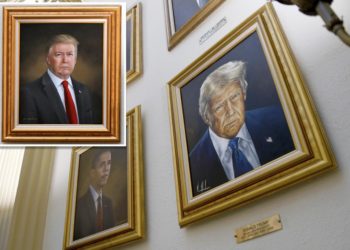The air is thick with recession talk, and stocks are cratering. But it just may be a mirage, a refraction of partisan distortions.
So where did this recession talk come from? It started with a projection from the Federal Reserve Bank of Atlanta that the economy is on pace to shrink in the first quarter. You could almost hear people on the left squeal with delight that the data were confirming their concerns about the Trump presidency. Those squeals led to equally absurd counterclaims from the right.
But this projection — which the Atlanta Fed affectionately calls GDPNow — is not a typical economic forecast, and it doesn’t actually tell us much. It’s a mechanical tool used to hoover up economic numbers as they become available, to try to squeeze out underlying signals about the country’s economic health.
It usually works quite well. But in certain circumstances, it can misfire.
That’s what appears to be happening now. The problem is that the GDPNow calculator has been fed the worrying data about a bump in imports, as people bought imported goods in anticipation of a price rise, but it hasn’t yet been fed other, more reassuring data on personal consumption and business investment, which will also get a boost from this surge in import spending. When it does, the calculator will start to give more reliable signals.
This glitch was pretty obvious to many economists, and indeed, late last week, an economist at the Atlanta Fed owned up to it, suggesting — in a somewhat indirect, central-bankerly way — that much of the bump was actually gold imports, and that most people may be better off ignoring this measure for now.
But news like this is too hot to be ignored in a polarized environment. For possibly the first time ever, the @AtlantaFed X account went viral. Many critics of President Trump jumped on its forecast; Senator Elissa Slotkin of Michigan added a recession warning in the speech she gave as a Democratic rebuttal to Mr. Trump’s address to a joint session of Congress last Tuesday. The “Trumpcession” was born. Of course, that’s not where the story ends.
Elon Musk seems to have convinced himself that this recession sighting was actually caused by the Department of Government Efficiency, the initiative he leads, cutting so much government spending. The reality is that Mr. Musk’s role in the economy is far smaller than he imagines it to be. The $30 billion in “receipts” claimed by DOGE as cost savings (a number that may be far overstated) is only 0.1 percent of U.S. annual output.
Other pro-Trump forces then pinned the blame for the recession that isn’t yet happening on former President Joe Biden. Scott Bessent, the Treasury secretary, recently falsely claimed to have inherited a private sector in recession. (It’s been growing just as healthily as the public sector.) On Fox Business, instead of celebrating a healthy jobs report, the host Maria Bartiromo instead wondered if it was a sign of “Biden’s recession.”
All of this is happening against the backdrop of Mr. Trump imposing tariffs and tanking the markets, then pausing them, then repeating the cycle.
Obviously, this is no way to run an economy. Perhaps a downturn has started to feel inevitable, as the White House began to describe a recession as necessary medicine. In his address to the joint session of Congress, Mr. Trump dismissed concerns about the impact of tariffs as “a little disturbance.” Mr. Bessent declared the economy would go through a “detox period.” On Sunday, Mr. Trump predicted “a period of transition” and, when asked whether he expected a recession, refused to rule one out, responding, “I hate to predict things like that.”
The uncertainty alone is alarming. But let me share two simple reasons for optimism.
First, the hard numbers tell us that the economy is in very good shape. Unemployment is low, output is growing, and inflation is down close to normal levels. We don’t yet have many hard numbers about the economy since Mr. Trump became president, but we do know that employers have kept adding workers to their payrolls, unemployment claims remain relatively low and there have been no major external economic shocks.
It’s almost impossible to believe the economy is in recession, given that 151,000 jobs were created in February.
Second, the single best determinant of the future health of the economy is its current health. While many factors can buffet the economy, they’re notoriously difficult to forecast. And so in the absence of solid evidence that the future will be worse, it’s usually best to keep predicting more good health.
That simple formula helped me see through a similar mirage in 2022, when a drumbeat of commentary insisted a recession was just around the corner, even as the economic data were much more upbeat. Bloomberg Economics projected a 100 percent chance of a recession — the one that never arrived.
While I’m convinced that our current recession talk is premature, I’m no blind optimist. America’s biggest economic threat is the chaos sown by an unpredictable White House. Tariffs are on except when they’re off; DOGE cuts with a chain saw and keeps hitting arteries; fiscal discipline has gone missing; and rule by executive order has left nearly the entire Trump agenda tied up in court. At the same time, Mr. Trump’s whims are rewiring the postwar world order.
If there’s not something to scare you on that list, you’re not paying attention. Perhaps this is the point in the horror movie when you wake up and realize that the real threat is coming from inside the house. Indeed, that fear may be what catalyzes the next recession. It just hasn’t started yet.
The post Ignore the Loose Talk About Recession appeared first on New York Times.




